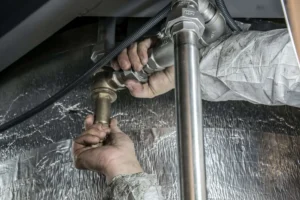Tankless water heaters are becoming increasingly popular among homeowners looking to upgrade their hot water systems. Unlike traditional tank-style heaters, tankless models heat water on demand, which can offer several benefits. However, there are also considerations to keep in mind. Here’s a look at the pros and cons of tankless water heaters for Florida homes.
Advantages of Tankless Water Heaters
Energy Efficiency
- What It Involves: Tankless water heaters heat water only when needed, rather than continuously storing hot water in a tank. This on-demand heating can lead to lower energy consumption.
- Why It Matters: By avoiding the standby heat loss associated with traditional tanks, tankless heaters can reduce your energy bills and lower your home’s overall energy usage.
Endless Hot Water
- What It Involves: Tankless systems provide a continuous supply of hot water as long as the unit’s capacity is not exceeded. This is because they heat water directly as it flows through the unit.
- Why It Matters: You won’t experience the cold water supply issue that sometimes occurs with traditional tank heaters when the tank is depleted, making it ideal for larger households or high-demand situations.
Compact Size
- What It Involves: Tankless water heaters are typically much smaller than traditional tank models and can be installed in various locations, including under sinks or in smaller utility rooms.
- Why It Matters: The compact size saves space, which is particularly beneficial in homes with limited storage or utility space. It also allows for more flexibility in installation.
Longer Lifespan
- What It Involves: Tankless water heaters generally have a longer lifespan compared to traditional tank heaters, often lasting 20 years or more with proper maintenance.
- Why It Matters: A longer lifespan means fewer replacements and potentially lower long-term costs, making it a durable investment for your home.
Lower Risk of Water Damage
- What It Involves: Since tankless systems do not store large amounts of water, there is a reduced risk of leaks and water damage associated with tank failures.
- Why It Matters: This can help prevent costly water damage repairs and reduce the likelihood of emergency plumbing situations.
Disadvantages of Tankless Water Heaters
Higher Initial Cost
- What It Involves: Tankless water heaters typically have a higher upfront cost compared to traditional tank models. Installation can also be more complex and costly.
- Why It Matters: The initial investment can be significant, which might be a consideration if you’re on a tight budget. However, the long-term savings on energy bills can offset this cost over time.
Limited Flow Rate
- What It Involves: The flow rate of a tankless water heater can be limited by the unit’s capacity. If multiple outlets are used simultaneously, you may experience reduced hot water flow or temperature fluctuations.
- Why It Matters: In homes with high hot water demand, such as those with multiple bathrooms or large families, choosing a unit with the appropriate capacity is crucial to ensure consistent hot water availability.
Installation Challenges
- What It Involves: Installing a tankless water heater may require upgrades to your home’s electrical or gas systems, depending on the type of unit you choose.
- Why It Matters: The need for additional modifications can increase installation costs and complexity. It’s essential to work with a qualified professional to ensure proper installation.
Maintenance Needs
- What It Involves: Tankless water heaters require regular maintenance, such as descaling to remove mineral buildup, particularly in areas with hard water.
- Why It Matters: While routine maintenance is straightforward, neglecting it can impact the unit’s efficiency and lifespan. Ensuring regular maintenance is essential for optimal performance.
Temperature Fluctuations
- What It Involves: Tankless systems may experience temperature fluctuations if the demand exceeds the unit’s capacity or if there are sudden changes in water flow.
- Why It Matters: This can lead to inconsistent water temperatures, which may be noticeable during peak usage times or when using multiple outlets.
Conclusion
Tankless water heaters offer several advantages, including energy efficiency, endless hot water supply, and space savings. However, they also come with drawbacks such as higher initial costs, potential flow rate limitations, and installation challenges. For Florida homeowners, evaluating these factors in the context of your household’s needs and usage patterns will help determine if a tankless water heater is a suitable option. With proper consideration and professional guidance, you can make an informed decision that enhances your home’s hot water system while maximizing long-term benefits.




